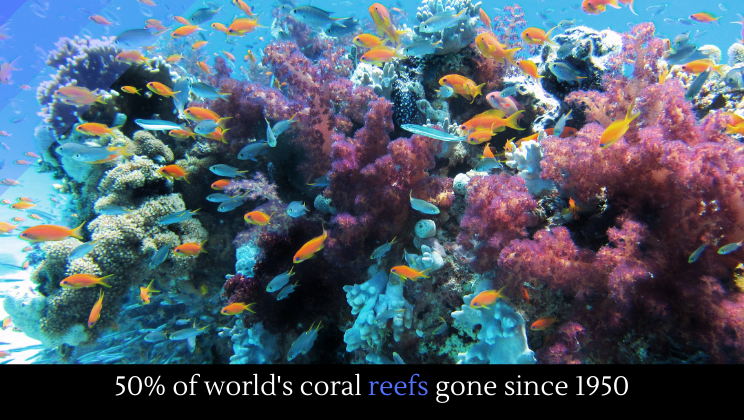50% of world’s coral reefs gone since 1950
Posted by Jimmy Cooper / September 20, 2021
The world has lost half of its coral reefs since the 1950s, according to a recent study.
More than 220 medical journals have warned that climate change is causing such harm to peoples’ health that we cannot wait for the pandemic to end before taking drastic action. Scientists have warned that a glacier in the Canadian Rockies is melting faster than it ever has in recorded history. This year’s heat waves and wildfires have caused massive ice loss, potentially disrupting the local ecosystem for generations to come.
Meanwhile, all national forests in California have been closed until September due to the state’s “wildfire crisis,” according to the U.S. Forest Service. The hope is that closing the forest will prevent more fires and keep firefighters safe and able to concentrate their efforts on preexisting fires.
The deadly flooding in Germany last month was fueled by climate change, according to a recent study. Last week, for the first time in recorded history, rain fell instead of snow on Greenland’s summit two miles above sea level.
In an another alarming first, federal officials declared a first-ever water shortage in the Colorado River, which fills the lake Mead reservoir serving Arizona, California, Nevada and Mexico. It is little wonder levels are low––according to NOAA, July was Earth’s hottest month on record.
Nearly 14,000 scientists from 34 countries have come together to warn of the Earth’s climate crisis. “We are nearing or have already crossed tipping points associated with critical parts of the Earth system, including the West Antarctic and Greenland ice sheets, warm-water coral reefs, and the Amazon rainforest,” the scientists wrote, “Given these alarming developments, we need short, frequent, and easily accessible updates on the climate emergency.”
The amount of energy the Earth absorbs from the sun has, for most of planet’s history, been in equilibrium with the amount of energy the Earth emits back into space. Recently, however, that balance has been thrown off, and recent research has just revealed that there is a less than 1% chance that such an imbalance could have occurred naturally. You can read the paper here.
Eastern Europe––including southern Italy, Greece, and Turkey––is coming off record-breaking temperatures only to enter even higher temperatures as another heatwave set in. That earlier heatwave caused massive ice melt in Greenland. Additionally, a “heat dome” is set to punish the United States with extreme temperatures, making for yet another brutal heat wave this summer.
According to a recent study, extreme heat and cold is killing 5 million people a year, and the number is rising as temperatures get more extreme. The United States has just experienced the hottest June in the 127 years since record keeping began. Even though it’s early, the West has been experiencing a tremendously hot summer.
More than a billion animals living on the British Colombia seashore may have died during the last heatwave. Animals like mussels, clams, sea stars, and others died en masse along the shore, leading to a horrible smell and a ravaged ecosystem.
Canadians on the west side of the country had to ditch the usual light sweaters for bathing suits as temperatures soared this week to nearly 116º, shattering heat records for the region. So far, at least 230 people have died from the heat and a thousand people had to be evacuated from a town as a wildfire raged. Fire clouds in the region led to over 700,000 lightning strikes, a highly unusual event in Canada.
Earlier this month, NASA and NOAA said the Earth is now trapping an unprecedented amount of heat, which is contributing to rapidly warming air, water, and land. That helps to explain the heatwave heading to the American West, and some 200 million people are expected to suffer through 90º weather––another 40 million will be sweating through 100º+ weather. Although there has been progress towards addressing climate change (see below), this is a reminder that we are still in––forgive the pun––hot water. The spiking temperatures are likely to bring a dubious honor to the United States: World’s Hottest Place. Nevada had already set a record for high temperatures for this time of year.
More news.
Comments are off for this post.